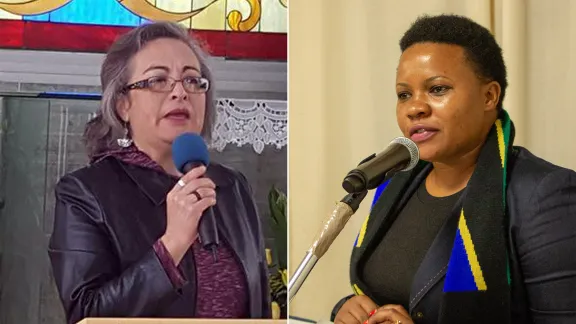
Rev. Dr Angela del Consuelo Trejo Haager, coordinator of LWFâs Latin American and Caribbean Gender Justice Network and Ms Faustina Nillan, ELCTâs National Director for women and children Photo: Private; Doug Hostetter
LWF delegates at CSW65 shine spotlight on ways of challenging patriarchal practices in Mexico and Tanzania
(LWI) - “Let us be prophetic voices of freedom and justice, even when social norms are difficult to change.” That was the call to action from Rev. Dr Angela del Consuelo Trejo Haager, a member of the Lutheran World Federation (LWF) delegation at the 65th session of the United Nations Commission on the Status of Women (CSW) taking place from 15 to 26 March.
Trejo, one of the first women to be ordained into the Mexican Lutheran Church, was speaking at an online event exploring how to challenge and change social norms that continue to impede progress towards gender equality. As a professor of feminist biblical hermeneutics, gender theology and church history, she looked back at the struggle of women in her country to gain the right to vote.
The 17 March event was organized by the LWF in partnership with ACT Alliance, Islamic World Relief, Side by Side, the World Council of Churches, Christian Aid, Religions for Peace and the All Africa Conference of Churches. It was one of the many parallel events sponsored by Non-Governmental Organizations taking part in the CSW65, which is focused on women’s full and effective participation and decision making in public life.
Challenging patriarchal discourse
Rev. Dr Trejo, a coordinator of the LWF’s Latin American and Caribbean Gender Justice Network, noted that the struggle for women’s suffrage in Mexico began back in the late 19th century and early 20th century, though it was not until the federal elections of July 1955 that women were able to cast their ballots for the first time. Even then, she said, there were many restrictions placed on female voters, who were expected to “listen to the advice of their husbands” and always place their “domestic duties” before social or political participation.
Over the decades since then, Trejo said, Mexican women have continued to challenge such “patriarchal discourse,” to “raise their voices loud and clear to denounce injustice” and to claim their space in the public square. They have shown that it is possible to change social norms, she said, but there is still “much work to do as women of faith” to promote gender justice in her country, which has one of the highest rates of femicides in the world.
Another LWF delegate taking part in the online event was Ms Faustina Nillan, National Director for women and children with the Evangelical Lutheran Church in Tanzania and coordinator for the Tanzanian chapter of the Side by Side faith movement for gender justice. She spoke about challenging and changing deeply-rooted social norms such as Female Genital Mutilation (FGM) which continues to affect one in 10 women in her country.
Strengthening action to end FGM and unpack the myth surrounding this practice is vital to ensure full potential and participation of women in leadership and decision making.
This traditional practice, considered an “integral part of the culture,” poses “significant barriers to health and development, specifically for adolescent girls and women in general,” she noted. "Strengthening action to end FGM and unpack the myth surrounding this practice is vital to ensure full potential and participation of women in leadership and decision making," she said.
After examining the root causes of this practice, Nillan spoke about ways of supporting survivors and working to change attitudes to promote the implementation of anti-FGM legislation. Initiatives that are underway in her country include establishing alternative rites of passage for girls, providing alternative sources of income for FGM practitioners, increasing support for community awareness programs and providing multi-media communication to amplify the voices of marginalized communities.
Participants agreed that in order to change patriarchal norms, it is vital to forge effective partnerships between women and men, in particular among members of different faith groups, who together represent over eighty percent of the global population. Mousumi Saikia, Partnerships and Program Development Manager for Islamic Relief Worldwide, stressed that religious leaders have “reservoirs of trust in their communities” and can become “champions for change” by listening to the critical voices of survivors of gender-based violence and by mobilizing a community-led response to protect all women and girls.
LWF/P. Hitchen
The Lutheran World Federation is participating in the CSW with a delegation of over seventy members from more than 30 countries, lifting up the voices of women and men working as gender justice advocates in different parts of the globe. Coordinated by the Lutheran Office for World Community in New York, participants advocate with government delegations and take part in many public events in collaboration with ecumenical and interfaith partners.
Support LWF's Gender Justice work.


